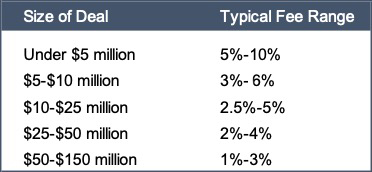Understanding Transaction Advisory Fees
Real Expertise Is an Investment, and the Benefits in Return Should Well Exceed the Costs
In the previous article, we highlighted the various benefits of hiring a financial advisor when investigating the potential sale of a business.
In a transaction with an outside party, the buyer will almost always be far more experienced in “deal-making” relative to the seller, who often will be undertaking the process for the first (and likely only) time. With such an imbalance, it is important for sellers to level the playing field by securing competent legal, tax and financial expertise.
A qualified sell-side advisor will help ensure an efficient process while also pushing to optimize the terms and proceeds of the transaction for the sellers.
As with anything in this world, favorable transaction processes and outcomes require an investment. Fee structures for transaction advisory services can vary widely based on the type and/or size of the business, the specific transaction situation, and the varying roles and responsibilities of the advisor in the transaction process.
Even with this variance, most fee structures fall within a common general framework and include two primary components: 1) Project Fees and 2) Success Fees.
Project Fees
Project fees are paid to advisors throughout an engagement for the various activities performed on the project. Such activities include the initial valuation assessment, development of the Confidential Information Memorandum, development of the potential buyer list, and other activities. These fees generally include an upfront “retainer” fee paid at the beginning of the engagement.
Retainer fees serve to ensure that a seller is serious about considering the sale of their business. For lower middle market transactions, the upfront retainer fee is typically in the $10,000 to $20,000 range.
Often times, a fixed monthly project fee will be charged throughout the term of the engagement. These fees are meant to cover some, but not all, of an advisor’s costs associated with the project.
For lower middle market transactions, monthly fees are typically $5,000 to $10,000. In certain situations, the engagement will include hourly fees paid throughout the engagement for the hourly time billed by the advisor. Such hourly fees are billed in place of a fixed monthly project fee.
Hourly fees are typically appropriate when the project is more advisory-oriented versus being focused on turn-key transaction execution. Hourly fees serve to emphasize the objective needs of the client by counter-balancing the incentive for an advisor to “push a deal through” that may not be in the best long-term interests of the client.
An hourly fee structure typically front loads the fees paid throughout the transaction process and is paired with a reduced success fee structure at closing which brings total fees back in line with market norms.
Mercer Capital has had favorable outcomes with numerous clients when fee structures are well-tailored to the facts and circumstances of the seller and the seller’s options in the marketplace.
Success Fee
A success fee is paid to a transaction advisor upon the successful closing of a transaction. Typically, success fees are paid as part of the disbursement of funds on the day of closing. As with project fees, success fees can be structured in a number of different ways.
A simple approach is to apply a flat percentage to the aggregate purchase price to calculate the success fee. The use of a flat percentage fee seems to have increased in recent years, and makes a fair bit of sense as it allows the client to clearly understand what the fees will look like on the back-end of a transaction.
Traditionally, the most used success fee structure employs a waterfall of rates and deal valuation referred to as the Lehman Formula. This formula calculates the success fee based on declining fee percentages applied to set increments (“tranches”) of the total transaction purchase price.
For lower middle market transactions, the simplest Lehman approach is a 5-4-3-2-1 structure: 5% on the first million dollars, 4% on the next million, and so on down to 1% on any amount above $4 million. The Lehman Formula, which can be applied using different percentages and varying tranche amounts, pays lower percentages in fee as the purchase price gets higher. Smaller deals may include a modified rate structure (for example 6-5-4-3-2) or may alter the tranche increments from $1 million to $2 million.
The Lehman Formula, in its varying forms, has been utilized to calculate transaction advisory fees for decades. While the formula may add some unnecessary complexities to the calculation (versus say a flat percentage), it has proven over time to provide reasonable fee levels from the perspective of both sell-side advisors and their clients.
A success fee can also be structured on a tiered basis, with a higher percentage being paid on transaction consideration above a certain benchmark. If base-level pricing expectations on a transaction are $15 million, the success fee might be set at 2.5% of the consideration up to $15 million and 5% of the transaction consideration above this level. If the business were sold for $18 million, the fee would be 2.5% of $15 million plus 5% of $3 million. The blended fee in this case would total $525,000, a little under 3% of the total consideration.
Escalating success fees are often favored by clients because they provide an incentive for advisors to push for maximized deal pricing rather than settling for an easier deal at a lower price.
Typical Total Fees
Transaction advisory fees, on a percentage basis, tend to be higher for smaller transactions and decline as the dollars of transaction consideration increases. Various surveys of transaction advisors are available online that suggest typical fee ranges.
Consensus figures from these sources are outlined below. Based on our experience, these “typical” ranges (or at least the upper end of each range) appear to be somewhat inflated relative to what most business owners should expect in an actual transaction advisory engagement.

Mercer Capital’s View on Fees
At Mercer Capital, we tailor fees in every transaction engagement to fit both the transaction situation at hand and our client’s objectives and alternatives.
In situations where a client has an identified buyer, we understand that our role will likely be focused on valuation and negotiation. Many sellers are unaware that price is only one aspect of the deal, and terms are another. Altering the terms of a definitive agreement can move the needle by 5%-10% and can potentially accelerate end-game liquidity by 6 to 12 months.
Accordingly, we design each fee structure to recognize what we are bringing to the process, typically utilizing some combination of hourly billings and a tiered success fee structure on the portions of the deal where our services are making a difference in the total outcome.
If we are assisting a client through a full auction process, it may be appropriate to utilize a more traditional Lehman Formula or a flat percentage calculation. A primary focus of our initial conversations with a potential client is to understand the situation in detail so that we can develop a fee structure that ensures that the client receives a favorable return from their investment in our services.
Mercer Capital provides transaction advisory services to a broad range of public and private companies and financial institutions. We have worked on hundreds of consummated and potential transactions since Mercer Capital was founded in 1982.
Mercer Capital leverages its historical valuation and investment banking experience to help clients navigate critical transactions, providing timely, accurate, and reliable results. We have significant experience advising shareholders, boards of directors, management, and other fiduciaries of middle-market public and private companies in a wide range of industries.
Rather than pushing solely for the execution of any transaction, Mercer Capital positions itself as an advisor, encouraging the right decision to be made by its clients. We recommend to clients to accept the right deal or no deal at all.
Our dedicated and responsive team is available to manage your transaction process. To discuss your situation in confidence, give us a call.




